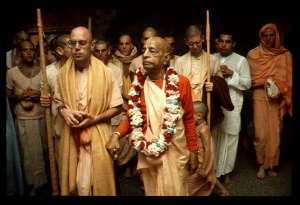BG 4.19: Difference between revisions
m (1 revision(s)) |
(Vanibot #0054 edit - transform synonyms into clickable links, which search similar occurrences) |
||
| (One intermediate revision by one other user not shown) | |||
| Line 1: | Line 1: | ||
{{ | [[Category:Bhagavad-gita As It Is (1983+) - Chapter 04]] | ||
<div style="float:left">'''[[Bhagavad-gita As It Is (1983+)]] - [[BG 4 (1983+)|Chapter 4: Transcendental Knowledge]]'''</div> | |||
<div style="float:right">[[File:Go-previous.png|link=BG 4.18]] '''[[BG 4.18]] - [[BG 4.20]]''' [[File:Go-next.png|link=BG 4.20]]</div> | |||
{{CompareVersions|BG|4.19|BG 1972|BG 1983+}} | |||
{{RandomImage}} | |||
==== TEXT 19 ==== | ==== TEXT 19 ==== | ||
<div class="devanagari"> | |||
:यस्य सर्वे समारम्भाः कामसङ्कल्पवर्जिताः । | |||
:ज्ञानाग्निदग्धकर्माणं तमाहुः पण्डितं बुधाः ॥१९॥ | |||
</div> | |||
<div | <div class="verse"> | ||
:yasya sarve samārambhāḥ | |||
:kāma-saṅkalpa-varjitāḥ | |||
:jñānāgni-dagdha-karmāṇaṁ | |||
:tam āhuḥ paṇḍitaṁ budhāḥ | |||
</div> | </div> | ||
==== SYNONYMS ==== | ==== SYNONYMS ==== | ||
<div class="synonyms"> | |||
<div | ''[//vanipedia.org/wiki/Special:VaniSearch?s=yasya&tab=syno_o&ds=1 yasya]'' — one whose; ''[//vanipedia.org/wiki/Special:VaniSearch?s=sarve&tab=syno_o&ds=1 sarve]'' — all sorts of; ''[//vanipedia.org/wiki/Special:VaniSearch?s=samārambhāḥ&tab=syno_o&ds=1 samārambhāḥ]'' — attempts; ''[//vanipedia.org/wiki/Special:VaniSearch?s=kāma&tab=syno_o&ds=1 kāma]'' — based on desire for sense gratification; ''[//vanipedia.org/wiki/Special:VaniSearch?s=saṅkalpa&tab=syno_o&ds=1 saṅkalpa]'' — determination; ''[//vanipedia.org/wiki/Special:VaniSearch?s=varjitāḥ&tab=syno_o&ds=1 varjitāḥ]'' — are devoid of; ''[//vanipedia.org/wiki/Special:VaniSearch?s=jñāna&tab=syno_o&ds=1 jñāna]'' — of perfect knowledge; ''[//vanipedia.org/wiki/Special:VaniSearch?s=agni&tab=syno_o&ds=1 agni]'' — by the fire; ''[//vanipedia.org/wiki/Special:VaniSearch?s=dagdha&tab=syno_o&ds=1 dagdha]'' — burned; ''[//vanipedia.org/wiki/Special:VaniSearch?s=karmāṇam&tab=syno_o&ds=1 karmāṇam]'' — whose work; ''[//vanipedia.org/wiki/Special:VaniSearch?s=tam&tab=syno_o&ds=1 tam]'' — him; ''[//vanipedia.org/wiki/Special:VaniSearch?s=āhuḥ&tab=syno_o&ds=1 āhuḥ]'' — declare; ''[//vanipedia.org/wiki/Special:VaniSearch?s=paṇḍitam&tab=syno_o&ds=1 paṇḍitam]'' — learned; ''[//vanipedia.org/wiki/Special:VaniSearch?s=budhāḥ&tab=syno_o&ds=1 budhāḥ]'' — those who know. | ||
</div> | </div> | ||
==== TRANSLATION ==== | ==== TRANSLATION ==== | ||
<div class="translation"> | |||
<div | |||
One is understood to be in full knowledge whose every endeavor is devoid of desire for sense gratification. He is said by sages to be a worker for whom the reactions of work have been burned up by the fire of perfect knowledge. | One is understood to be in full knowledge whose every endeavor is devoid of desire for sense gratification. He is said by sages to be a worker for whom the reactions of work have been burned up by the fire of perfect knowledge. | ||
</div> | </div> | ||
==== PURPORT ==== | |||
= | <div class="purport"> | ||
Only a person in full knowledge can understand the activities of a person in Kṛṣṇa consciousness. Because the person in Kṛṣṇa consciousness is devoid of all kinds of sense-gratificatory propensities, it is to be understood that he has burned up the reactions of his work by perfect knowledge of his constitutional position as the eternal servitor of the Supreme Personality of Godhead. He is actually learned who has attained to such perfection of knowledge. Development of this knowledge of eternal servitorship to the Lord is compared to fire. Such a fire, once kindled, can burn up all kinds of reactions to work. | |||
</div> | |||
<div | <div style="float:right; clear:both;">[[File:Go-previous.png|link=BG 4.18]] '''[[BG 4.18]] - [[BG 4.20]]''' [[File:Go-next.png|link=BG 4.20]]</div> | ||
__NOTOC__ | |||
</div> | __NOEDITSECTION__ | ||
__NOTOC__ | |||
Latest revision as of 15:28, 17 February 2024

A.C. Bhaktivedanta Swami Prabhupada
TEXT 19
- यस्य सर्वे समारम्भाः कामसङ्कल्पवर्जिताः ।
- ज्ञानाग्निदग्धकर्माणं तमाहुः पण्डितं बुधाः ॥१९॥
- yasya sarve samārambhāḥ
- kāma-saṅkalpa-varjitāḥ
- jñānāgni-dagdha-karmāṇaṁ
- tam āhuḥ paṇḍitaṁ budhāḥ
SYNONYMS
yasya — one whose; sarve — all sorts of; samārambhāḥ — attempts; kāma — based on desire for sense gratification; saṅkalpa — determination; varjitāḥ — are devoid of; jñāna — of perfect knowledge; agni — by the fire; dagdha — burned; karmāṇam — whose work; tam — him; āhuḥ — declare; paṇḍitam — learned; budhāḥ — those who know.
TRANSLATION
One is understood to be in full knowledge whose every endeavor is devoid of desire for sense gratification. He is said by sages to be a worker for whom the reactions of work have been burned up by the fire of perfect knowledge.
PURPORT
Only a person in full knowledge can understand the activities of a person in Kṛṣṇa consciousness. Because the person in Kṛṣṇa consciousness is devoid of all kinds of sense-gratificatory propensities, it is to be understood that he has burned up the reactions of his work by perfect knowledge of his constitutional position as the eternal servitor of the Supreme Personality of Godhead. He is actually learned who has attained to such perfection of knowledge. Development of this knowledge of eternal servitorship to the Lord is compared to fire. Such a fire, once kindled, can burn up all kinds of reactions to work.